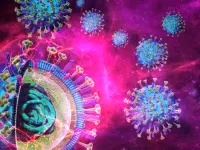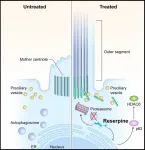(Press-News.org) Study Title: Aberrant cell state plasticity mediated by developmental reprogramming precedes colorectal cancer initiation
Publication: Science Advances: March 29, 2023, 2:00pm ET 10.1126/sciadv.adf0927
Dana-Farber Cancer Institute author: Pratyusha Bala, PhD, Jonathan P. Rennhack, PhD, Daulet Aitymbayev, MS, Matthew B. Yurgelun, MD, William C. Hahn, MD, PhD, Nilay S. Sethi, MD, PhD
Summary:
Normally the lining of the colon forms a series of steep hills and valleys. At the surface, where the hills peak, are functional colon cells that do the organ’s work of absorption and secretion. Deep in the valleys are stem cells that constantly renew those functional cells. New research from Dana-Farber Cancer Institute found that the cells in those valleys can go through a transition before cancer begins. Using mouse models and tumor models called patient-derived organoids, they found that the cells undergo a type of molecular time travel that reverts them back to an embryonic state. Fetal genes that are silenced in adults are inappropriately turned on, endowing greater cellular flexibility. But instead of creating functional cells that migrate to the surface, they create immature, non-functional cells that clump together to form benign growths called adenomas. Over time, these adenomas can turn cancerous. Over 80% of colorectal cancers show signs of mutations that are related to this immature state of impaired differentiation. The researchers also found that this molecular time travel depends on a protein called Sox9 and that blocking Sox9 in mouse models prevented adenoma formation, enabled cells to mature, and resulted in the death of pre-cancer cells. The work builds on previous research from the Sethi Lab at Dana-Farber suggesting that human colon cancer depends on Sox9.
Impact:
Approximately 80% of colorectal cancers harbor mutations that interrupt cellular differentiation, resulting in the buildup of immature pre-cancerous cells. These insights, however, have not resulted in clinically effective medicines. This study looks at what happens before the emergence of these mutations and finds not only evidence of fetal reprogramming that can initiate cancer, but also a protein, Sox9, that fuels that reprogramming. This and previous research from the Sethi Lab suggest Sox9 is a promising therapeutic target for colorectal cancer.
Funding:
This research was funded by the Harvard Digestive Disease Center, the National Institutes of Health, the National Cancer Institute, the US Department of Defense, the Jimmy Fund Walk (the Opiela Family), and Howard and Wendy Cox.
Contact: Victoria Warren Victoria_Warren@dfci.harvard.edu 617-939-5531
END
Sox9 protein enables molecular time travel that can lead to colorectal cancer
2023-03-29
ELSE PRESS RELEASES FROM THIS DATE:
Ancient African empires’ impact on migration revealed by genetics
2023-03-29
Traces of ancient empires that stretched across Africa remain in the DNA of people living on the continent, reveals a new genetics study led by UCL researchers.
Published in Science Advances, the collaboration between UCL geneticists working alongside anthropologists, archaeologists, historians and linguists in Africa and beyond found evidence for when different peoples intermixed across the continent. Their findings indicate migration linked to vast empires such as the Kanem-Bornu and the kingdoms of Aksum and Makuria, ...
Method for improving seasonal flu vaccines also aids pandemic prediction
2023-03-29
(MEMPHIS, Tenn. – March 29, 2023) Improving the seasonal influenza vaccine and public health specialists’ ability to predict pandemic potential in new flu strains may be possible due to new findings from scientists at St. Jude Children’s Research Hospital. The key is the stability of a viral protein that gains entry into human cells. The findings were published today in Science Advances.
“We found that the protein flu viruses use to enter cells, hemagglutinin, needs to be relatively stable and resistant to acid in an effective H3N2 flu vaccine,” said senior and co-corresponding ...
Model for predicting transmission of COVID-19 can help policymakers monitor virus, inform health surveillance systems
2023-03-29
The COVID-19 pandemic presents unprecedented challenges to public health worldwide. Tracking the dynamics of the coronavirus permits governments, organizations, and individuals to make projections in an effort to curb the spread of the pandemic. But while a large amount of data about COVID is collected and publicly available, the information can be unreliable and subject to bias. In a new study, researchers analyzed data from Cali, Colombia, to develop a model that provides a template for tracking data, predicting transmission, and informing health surveillance systems.
The study was conducted by researchers at Carnegie Mellon ...
FDA-approved drug shows promise in lab models for blinding childhood disease
2023-03-29
A National Eye Institute-led team has identified a compound already approved by the U.S. Food and Drug Administration that keeps light-sensitive photoreceptors alive in three models of Leber congenital amaurosis type 10 (LCA 10), an inherited retinal ciliopathy disease that often results in severe visual impairment or blindness in early childhood.
LCA 10 is caused by mutations of the cilia-centrosomal gene (CEP290). Such mutations account for 20% to 25% of all LCA – more than any other gene.
Using a mouse model of LCA10 and two types of lab-created tissues from stem ...
OHIO diabetes researchers discover the potential of CIDEC protein to mitigate obesity-related cardiometabolic disease
2023-03-29
A team of researchers from Ohio University’s Heritage College of Osteopathic Medicine recently discovered a novel role of human-CIDEC gene in improving metabolic dysfunction and cardiovascular health. The study, “Endothelial-Specific Expression of CIDEC Improves High-Fat Diet–Induced Vascular and Metabolic Dysfunction,” published in Diabetes focuses on vascular function and its association with metabolic diseases like insulin resistance, Type 2 diabetes, and cardiovascular disease.
“This is a very impactful study, and we have moved in the right direction to find a way to reduce cardiovascular ...
The COVID-19 pandemic has increased – but also polarised – trust in science
2023-03-29
Research by the Milner Centre for Evolution at the University of Bath, UK, along with colleagues at Universities of Oxford and Aberdeen, finds that trust in scientists has hugely increased overall since the COVID-19 pandemic, but that attitudes have also become more polarized. The study also found that people were more likely to take the COVID-19 vaccine if their trust in the science had increased.
Whether it be climate change, vaccines or GM foods, trust in science and scientists has rarely been more important. ...
DoD funds new project aimed at protecting global supply chains, infrastructure
2023-03-29
Thanks to the work of Arizona Sen. Mark Kelly, a new project led by Northern Arizona University, with various collaborators throughout the nation, will help the United States better protect the critical supply chain infrastructure and the supply chains that keeps the country and its economy running.
Benjamin Ruddell, professor in the School of Informatics, Computing, and Cyber Systems and founder of the FEWSION project, is the NAU lead. Funded at $8 million for year one, the project aims to work with technology known as Fused Global Data Analytics and Visualization. The team’s leadership, ...
CNIO researchers help to understand the functioning of the protein that makes DNA loops in the human genome
2023-03-29
Cohesin is a ring-shaped protein that surrounds and moves around the DNA molecule, forming the loops. It is a crucial process for the cell.
Understanding how cohesin works has been one of the challenges of molecular biology in recent decades.
The work now published by Ana Losada's group at CNIO will serve to deepen our understanding of the disease known as Cornelia de Lange syndrome.
At the end of the 1990s, Ana Losada, a researcher at the Spanish National Cancer Research Centre (CNIO), then at the Cold Spring Harbor Laboratory (New York, USA), discovered a protein in frogs of the Xenopus genus that is fundamental to ...
AI could set a new bar for designing hurricane-resistant buildings
2023-03-29
Being able to withstand hurricane-force winds is the key to a long life for many buildings on the Eastern Seaboard and Gulf Coast of the U.S. Determining the right level of winds to design for is tricky business, but support from artificial intelligence may offer a simple solution.
Equipped with 100 years of hurricane data and modern AI techniques, researchers at the National Institute of Standards and Technology (NIST) have devised a new method of digitally simulating hurricanes. The results of a study published today in Artificial Intelligence for the Earth Systems demonstrate that the simulations can accurately ...
Caesarean Scar Disorder: International study led by Amsterdam UMC defines a clinical condition
2023-03-29
More than 30% of women who give birth by caesarean section suffer from long-term symptoms, such as abdominal pain, blood loss or fertility problems. These symptoms are caused by an abnormal uterine scar. This condition is defined now for the first time, thanks to an international study led by Amsterdam UMC, as Caesarean Scar Disorder (CSDi). This gives women recognition for these problems after a caesarean section. In addition, international studies on CSDi can now be better compared with each other, providing more insight into treatment options. The research is published today in JAMA Network Open.
In ...


